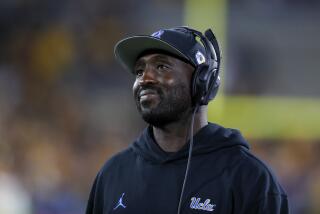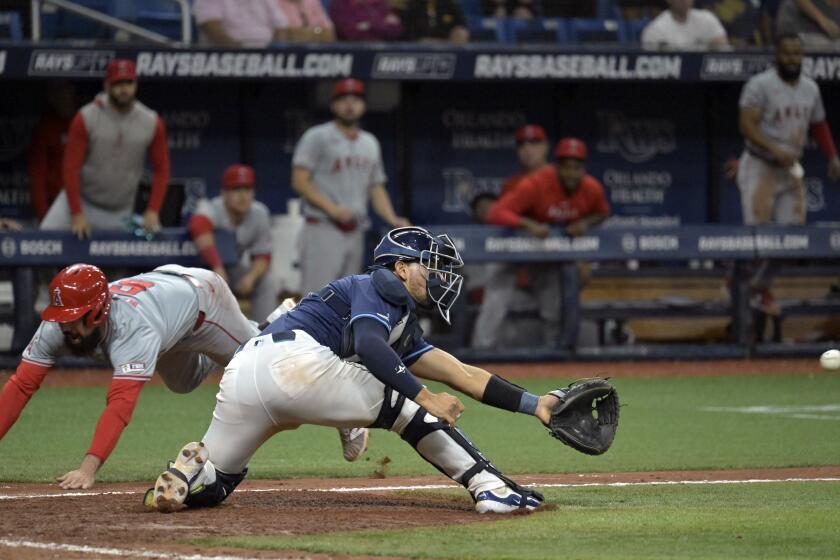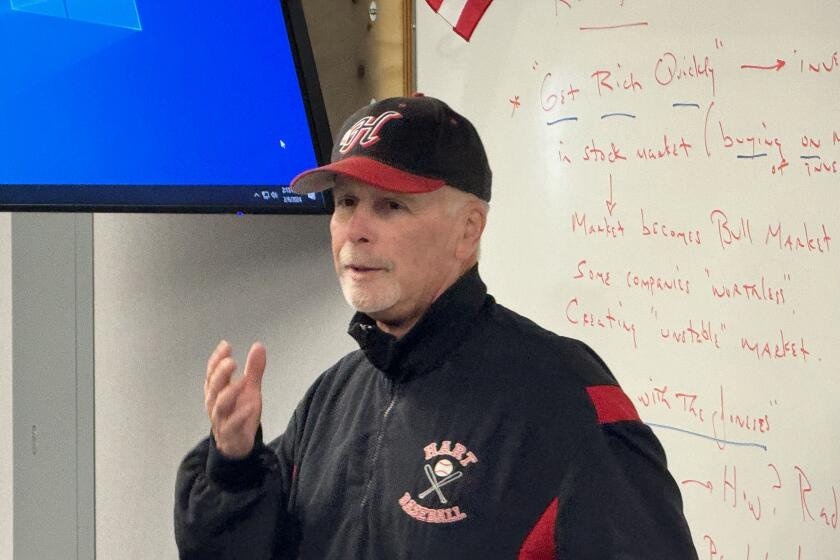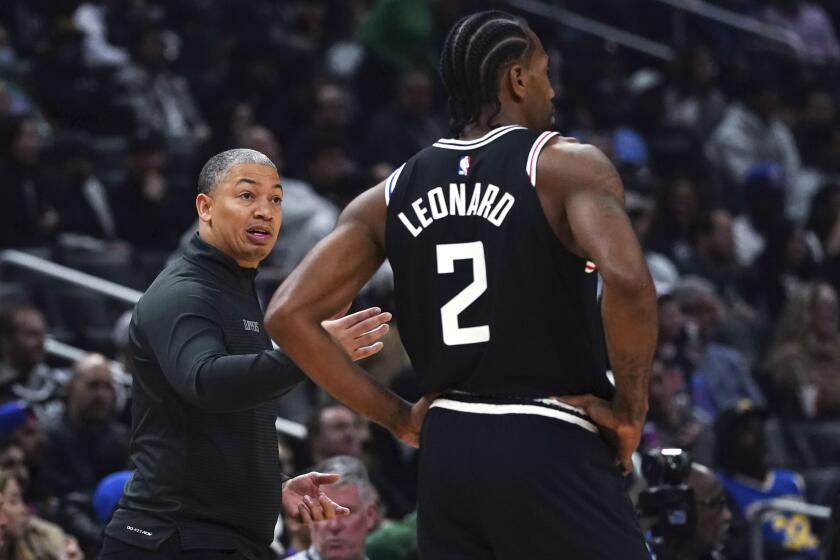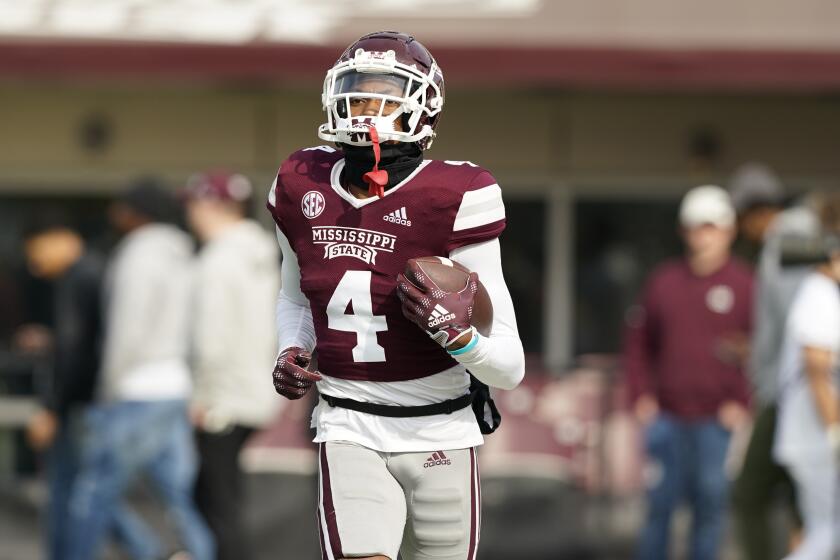Southern California shouldn’t play ball with the NFL
As talk heats up again (again?) about bringing a National Football League team back to Southern California after a 15-year halftime break, I propose that the following slogan be tattooed on the forehead of any civic booster associated with such a proposal:
“Remember Irwindale!”
Irwindale, for those of you who don’t remember, is the San Gabriel Valley community that got scammed into giving Raiders owner Al Davis a $10-million, nonrefundable down payment to bring his team over from the L.A. Coliseum. That was in 1987. Davis did move out of the Coliseum, but he didn’t stop moving until he reached Oakland. He kept the money anyway.
Perhaps I’m being unfair to the NFL, which doesn’t like to think of Davis as its ethical trend-setter. On the other hand, the league’s subsequent treatment of every stadium proposal since then hasn’t been that much better. Can the City of Industry proposal of real estate magnate Ed Roski or the convention center annex plan recently floated by Anschutz Entertainment Group executive Tim Leiweke and entertainment honcho Casey Wasserman break the mold?
Over the years, the NFL has played Anaheim off against Los Angeles, and both off against Carson. It has feigned — excuse me, “expressed” — interest in the Rose Bowl, the Coliseum and Hollywood Park as venues for a stadium. It has toyed with moguls such as Eli Broad and Michael Ovitz like a defensive tackle toys with a fumbled football. It has sent countless delegations of team owners to study proposed sites.
It has dangled visions of Super Bowls and jobs by the thousands before starry-eyed politicos. It has promised that L.A. would certainly have a team by “2009, 2010 or 2000-whenever,” in the words of former Commissioner Paul Tagliabue.
It’s 2010, and no team. On the other hand, there are still about 90 years to go before that “2000-whenever” deadline runs out.
Everyone in Southern California who has tried to play ball with this league has come away misused and humiliated. Reading the file of sound bites from moguls and political leaders proclaiming that they finally had the thing in the bag is like touring a museum of unalloyed schlemiel-dom. (The curator is my colleague Sam Farmer, who collected the following quotes.)
Here’s City Councilman Bernard Parks (circa 2004, re the Coliseum): “If we resolve the issues, then they’ve said clearly there’s no need to look at other sites.” Here’s John Moag, point man for the Rose Bowl, 2004: “Things are moving in the right direction.” Former Dodgers owner Peter O’Malley: “I can see it … putting the goal posts right here” (at Chavez Ravine, 1995). And R.D. Hubbard, owner of Hollywood Park: “There are just a few little items to be worked out” (also 1995).
The NFL’s goal has been to extract the most favorable deal for itself, regardless of the public costs. It has been offered public land for free or at a cut rate, tax abatements, concessions — in the latest round, the Legislature even abrogated a major state law to facilitate a stadium that isn’t built to host a team that we don’t have and to meet a deadline that doesn’t exist.
Can’t anyone here learn a lesson? For all that the NFL says it really wants to be back in the Los Angeles market, it finds it quite advantageous to leave this market wide open. Why? Because it’s a permanent threat to every other NFL community that dares to think about driving a hard bargain with its pro team.
As for the notion that the NFL is hurt by not having a team in the nation’s No. 2 media market — oh, sure. You think the NFL has suffered since it left L.A. (metro population: 17.8 million) and moved into the megalopolises of Jacksonville, Charlotte and Nashville (combined metro pop.: 3.55 million)? Show me, as they say, the money. Since 1994 the league’s TV contracts have tripled to $3 billion a year.
Once the California Legislature acted in October to clear a legal hurdle to Roski’s proposal, the price of poker went up for the municipal officials in San Diego, Minnesota and Jacksonville sitting across the table from the Chargers, Vikings and Jaguars, to name three teams angling for new stadiums or better deals.
But what about us? Let’s look at the latest Southern California proposals.
The Roski plan would place a 75,000-seat open-air stadium on a 592-acre parcel in the City of Industry, which is one of those communities that seems to have more cubic feet of rail cars than human beings. The promoters like to say that the location, which is bounded by the 60 and 57 freeways, lies within an hour’s drive of 16 million SoCal residents, but I like to think of it as nine miles from Irwindale.
Roski’s people e-mailed me to say they had no comment on their plans. That’s a big change from a few months ago, when they wouldn’t shut up about it. Back then, Roski’s spokesman John Semcken said there were seven NFL teams having trouble getting the stadium deals they wanted, including San Diego, Oakland and San Francisco, which tells you a bit about what it meant to the league to have a convenient stalking horse.
The City of Industry plan was dressed up as a multi-use retail/entertainment venue, but when you take a close look at the mock-ups, it resembled just another high-end retail ghetto, like the Grove or the Block at Orange.
Roski was canny enough to sell it as a job-creation device — up to 18,000 jobs, he claimed. That sounds like up to 18,000 slices of baloney, but it was enough to persuade the Legislature to exempt the project from the California Environmental Quality Act, our landmark environmental protection statute.
The next time you hear that this is supposed to be a private project, think about the damage to public policy that vote represents. “It seems that if you have a major project and you’re rich and you have access to the Legislature, you get special attention,” says state Sen. Alan Lowenthal (D-Long Beach), who opposed the exemption.
Supporters of the project claim the exemption is a special case and no precedent. That’s not a slice of baloney but a full loaf. Proponents of a San Diego stadium are already agitating for an exemption, and wouldn’t it only be fair to level the playing field for Leiweke and Wasserman?
Which brings us to their plan, which is still in an early stage. There are, truth be told, virtues to placing a football stadium downtown, hard by Staples Center and the underexploited Los Angeles Convention Center.
Leiweke has long maintained that there won’t be much more hotel or retail development in that neighborhood unless the convention center gets a major upgrade or a new amenity gets built. Wasserman has called a stadium “a final piece to the downtown puzzle,” which may be closer to the mark than plunking a venue in the City of Industry, 25 miles away.
But the problem remains the NFL, an entity that leaves more unhappy partners in its wake than anyone this side of Donald Trump. Some people have been saying that Commissioner Roger Goodell is less inclined to manipulate public officials than was his predecessor, Paul Tagliabue. We’ll see.
The league has already let it be known that there won’t be progress on bringing a team to L.A. at least until it completes work on a labor agreement with players to replace the contract expiring next year. That gives it many, many months to keep Roski and his new rivals dangling — just the kind of situation the league loves.
Anyone else want to join the fun?
Michael Hiltzik’s column appears Sundays and Wednesdays. Reach him at mhiltzik@latimes.com, read past columns at https://www.latimes.com/hiltzik, and follow @latimeshiltzik on Twitter.
More to Read
Get our high school sports newsletter
Prep Rally is devoted to the SoCal high school sports experience, bringing you scores, stories and a behind-the-scenes look at what makes prep sports so popular.
You may occasionally receive promotional content from the Los Angeles Times.


